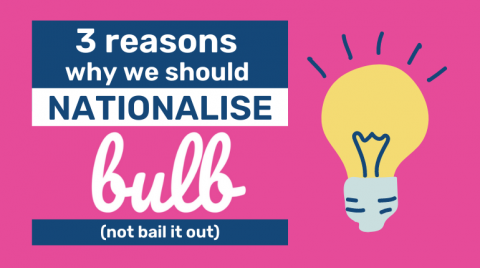
30 August 2022
Bulb collapsed in Autumn 2021, the largest of a string of private energy suppliers who folded as the energy crisis began. To prevent their customers being left in the dark, the government stepped in - and is planning to spend billions propping it up.
A year later and millions across the UK face a potentially deadly winter as bills have risen dramatically. Many will struggle even with the government's current measures, which cap bills at an average of £2,500 per household. The energy price cap has still more than doubled since 2021. And ultimately, the excessive profits of the big energy companies are being protected at our expense, as they are handed taxpayer money.
Right now, many people are asking what can be done to protect those on low and middle incomes from feeling the squeeze of the cost of living crisis and doubled bills. But the 66% of the public who support bringing energy into public ownership already have the answer.
Here are the top 3 reasons why the government should nationalise Bulb now:
1. A public supplier could REALLY keep bills down
Public energy suppliers have the power to protect us from rising bills. If nationalised, Bulb could treat energy as the vital public necessity that it is, rather than as a source of profit for shareholders. It could set a maximum percentage increase for bills, shouldering the costs instead of passing them on to millions who simply can’t afford to pay. The company could also set a social tariff capped at a percentage of income, and all UK bill payers could have the option of switching over.
How do we know this would work? For many countries, public energy suppliers are part of normal life - and are currently being used to protect households from the astronomical prices we’re facing in the UK. For example, the French government owns a majority of the energy supplier EDF, meaning they have been able to cap energy price rises to 4%. Compare this to the UK, where we’re facing an 80% rise, which by January could reach a staggering £5,386 a year.
And it’s not just France. Two thirds of the German and Italian populations are also served by public sector energy suppliers. Even in the USA, most households use state-owned energy suppliers. For example, Los Angeles’ energy system is run as a 100% municipally owned company, which managed to keep the lights on in the city throughout California’s dramatic energy crisis in 2000.
2. Bail outs benefit shareholders at the public’s expense
The government is on course to spend £2.2 billion propping up Bulb, covering the company’s operating losses following its collapse in 2021. They are now potentially going to waste a further £1bn of taxpayer’s money on another private company, Octopus, paying them to take it over.
But Bulb is already effectively in public hands, without shareholders to buy out. Rather than throwing even more public money down the drain, to persuade another private company to take on its 1.7 million customers, the government could use this as the basis for a new publicly owned energy supply company. It’s a no brainer.
And Bulb isn't the only company to fail - it's just been the largest so far. Since January 2021, 31 energy companies have gone bust, and nearly 6 million people have been displaced by their energy supplier collapsing in the last 4 years alone. When this happens, Ofgem has to step in and find people a new private supplier company to ensure that households aren't left without energy in the interim. This often means being moved onto a much higher tariff, without any choice in the matter. With Bulb as a new public entitiy, it would be able to absorb any failing companies and look after displaced bill-payers, rather than charging a premium.
3. In public hands, Bulb could help prevent future crises
While we’re facing the energy and cost of living crisis, we’re also feeling the effects of the climate emergency. Both of these crises highlight the urgent need for a transition to renewable energy.
9 out of 10 of the countries leading the energy transition to renewables are able to do this because they have a publicly owned energy generation company. With Bulb in public ownership, the government could take it one step further, setting it up to generate renewable energy as well as supplying it. This would result in more income, which could be used to keep bills down while helping set up an energy system fit for the future.
Not only would this support a green transition, moving us towards a fossil free future, but by generating more local energy through wind, water and solar, the UK could become more self-sufficient: less reliant on volatile oil and gas prices and therefore more sheltered from future price hikes.
Agree that Bulb should be nationalised? Sign the petition here!
Read more about public ownership of energy








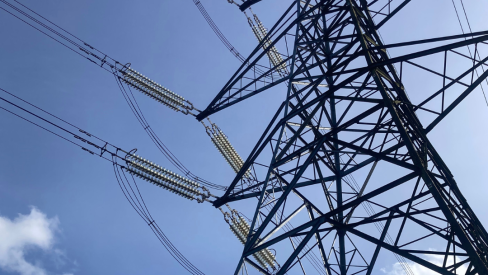
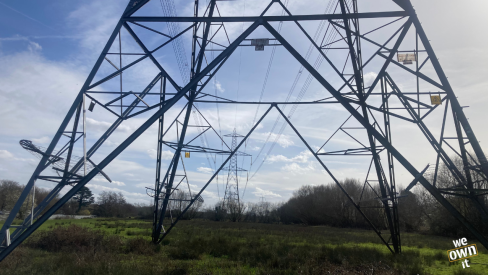
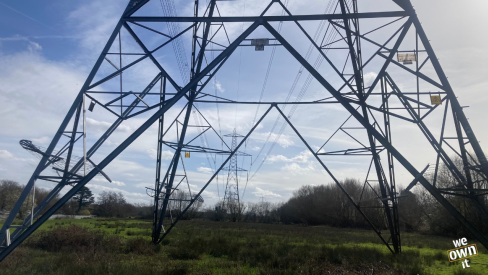
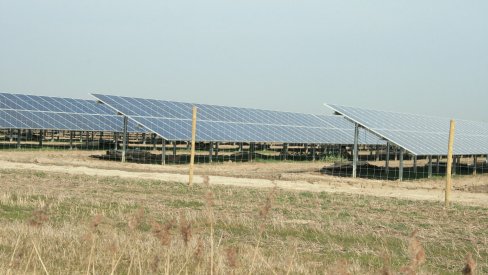



Comments
J Seamons replied on Permalink
Yes
ghassan latif replied on Permalink
I believe that if the government owns the energy sector like energy, water. They can save citizens a lot of money as well as make more as a source of income to the country as well, rather than keep rising taxes on us. Instead of bailing out private companies who make profit and run away
Gavin Williams replied on Permalink
Yes
Add new comment